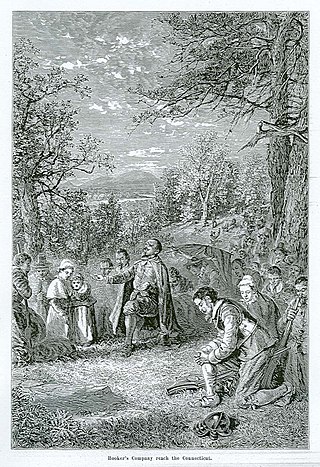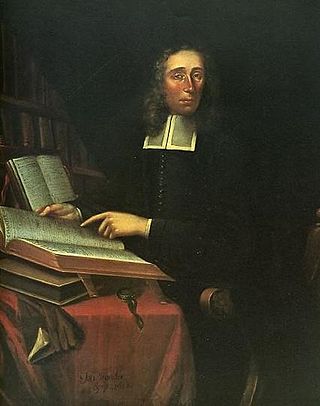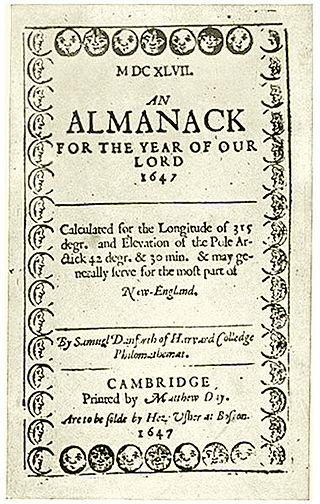Related Research Articles
Solomon Stoddard was the pastor of the Congregationalist Church in Northampton, Massachusetts Bay Colony. He succeeded Rev. Eleazer Mather, and later married his widow around 1670. Stoddard significantly liberalized church policy while promoting more power for the clergy, decrying drinking and extravagance, and urging the preaching of hellfire and the Judgment. The major religious leader of what was then the frontier, he was known as the "Puritan Pope of the Connecticut River valley" and was concerned with the lives of second-generation Puritans. The well-known theologian Jonathan Edwards (1703–1758) was his grandson, the son of Solomon's daughter, Esther Stoddard Edwards. Stoddard was the first librarian at Harvard University and the first person in American history known by that title.

Thomas Hooker was a prominent English colonial leader and Congregational minister, who founded the Connecticut Colony after dissenting with Puritan leaders in Massachusetts. He was known as an outstanding speaker and an advocate of universal Christian suffrage.

Increase Mather was a New England Puritan clergyman in the Massachusetts Bay Colony and president of Harvard College for twenty years (1681–1701). He was influential in the administration of the colony during a time that coincided with the notorious Salem witch trials.

John Eliot was a Puritan missionary to the American Indians who some called "the apostle to the Indians" and the founder of Roxbury Latin School in the Massachusetts Bay Colony in 1645. In 1660 he completed the enormous task of translating the Eliot Indian Bible into the Massachusett Indian language, producing more than two thousand completed copies.

John Cotton was a clergyman in England and the American colonies, and was considered the preeminent minister and theologian of the Massachusetts Bay Colony. He studied for five years at Trinity College, Cambridge, and nine years at Emmanuel College, Cambridge. He had already built a reputation as a scholar and outstanding preacher when he accepted the position of minister at St. Botolph's Church, Boston, in Lincolnshire, in 1612.

John Davenport was an English Puritan clergyman and co-founder of the American colony of New Haven.

Charles Chauncy was an Anglo-American Congregational clergyman, educator, and secondarily, a physician. He was the second President of Harvard.

Richard Mather was a New England Puritan minister in colonial Boston. He was father to Increase Mather and grandfather to Cotton Mather, both celebrated Boston theologians.

John Wheelwright was a Puritan clergyman in England and America, noted for being banished from the Massachusetts Bay Colony during the Antinomian Controversy, and for subsequently establishing the town of Exeter, New Hampshire. Born in Lincolnshire, England, he graduated from Sidney Sussex College, Cambridge. Ordained in 1619, he became the vicar of Bilsby, Lincolnshire, until he was removed for simony.

Samuel Willard was a New England Puritan clergyman. He was born in Concord, Massachusetts, graduated from Harvard College in 1659, and was minister at Groton from 1663 to 1676, before being driven out by the Indians during King Philip's War. Willard was pastor of the Third Church, Boston, from 1678 until his death. He opposed the Salem witch trials and was acting president of Harvard University from 1701. He published many sermons; the folio volume, A Compleat Body of Divinity, was published posthumously in 1726.

Samuel Danforth (1626–1674) was a Puritan minister, preacher, poet, and astronomer, the second pastor of The First Church in Roxbury and an associate of the Rev. John Eliot of Roxbury, Massachusetts, known as the “Apostle to the Indians.”

First Church in Boston is a Unitarian Universalist Church founded in 1630 by John Winthrop's original Puritan settlement in Boston, Massachusetts. The current building, located on 66 Marlborough Street in the Back Bay neighborhood, was designed by Paul Rudolph in a modernist style after a fire in 1968. It incorporates part of the earlier gothic revival building designed by William Robert Ware and Henry Van Brunt in 1867. The church has long been associated with Harvard University.

In the early 17th century, thousands of English Puritans settled in North America, almost all in New England. Puritans were intensely devout members of the Church of England who believed that the Church of England was insufficiently reformed, retaining too much of its Roman Catholic doctrinal roots, and who therefore opposed royal ecclesiastical policy. Most Puritans were "non-separating Puritans" who believed there should be an established church and did not advocate setting up separate congregations distinct from the Church of England; these were later called Nonconformists. A small minority of Puritans were "separating Puritans" who advocated for local, doctrinally similar, church congregations but no state established church. The Pilgrims, unlike most of New England's puritans, were a Separatist group, and they established the Plymouth Colony in 1620. Puritans went chiefly to New England, but small numbers went to other English colonies up and down the Atlantic.

Thomas Allen or Allyn was an East Anglian nonconformist minister and divine who preached during the 1640s in Charlestown, Massachusetts, but returned to England during the Commonwealth and was ejected after the Restoration. He was the author of various published works.
John Bryan, D.D., was an English clergyman, an ejected minister of 1662.
Rev. Joseph Hull (1596–1665) led a congregation of 104 from England to Massachusetts in 1635. He founded the Cape Cod town of Barnstable in 1639 and served as one of Maine’s earliest ministers. Hull's willingness to preach without approval from church officials and his efforts to chart a middle course between Anglicans and Puritans resulted in repeated conflicts with religious and colonial authorities.

John Wilson was a Puritan clergyman in Boston in the Massachusetts Bay Colony, and the minister of the First Church of Boston from its beginnings in Charlestown in 1630 until his death in 1667. He is most noted for being a minister at odds with Anne Hutchinson during the Antinomian Controversy from 1636 to 1638, and for being an attending minister during the execution of Mary Dyer in 1660.
Samuel Lee (1625–1691) was an English Puritan academic and minister, late in life in New England.

Congregationalism in the United States consists of Protestant churches in the Reformed tradition that have a congregational form of church government and trace their origins mainly to Puritan settlers of colonial New England. Congregational churches in other parts of the world are often related to these in the United States due to American missionary activities.

Zechariah Symmes was an English Puritan clergyman who emigrated to the Massachusetts Bay Colony in New England and became pastor of the First Church in Charlestown, an office he held continuously from 1634 to his death in 1671. Although not one of the original Charlestown founders of 1629, on arrival in 1634 he swiftly found his place among them in the church they had convened two years previously. One of the many emigrant ministers who emerged from Emmanuel College, Cambridge, he was a close fellow-worker among the leading lights of the "Bible Commonwealth".
References
- ↑ Woodford, Robert (2012). The Diary of Robert Woodford, 1637-1641. Cambridge University Press. p. 138, n. 183.
- ↑ Little, George Thomas (1909). Genealogical and family history of the state of Maine. Lewis Historical Publishing Company. p. 1779 . Retrieved 22 April 2009.
john mayo old north church.
- ↑ "Great Fires of the 17th and 18th Centuries". bpl.org. Boston Public Library . Retrieved October 26, 2024.
- ↑ Alex R. Goldfeld (2009). The North End: A Brief History of Boston's Oldest Neighborhood. Charleston, SC: History Press. OCLC 318292902.